► New 2023 Mercedes GLC review
► Downsized engines and more hybrids
► We drive Merc’s bestselling SUV
It’s awfully tricky to be seen by so many when you’re selling an SUV these days, even if you happen to be the oldest car manufacturer in the world. Even so, the GLC has been a massive hit for Mercedes in the UK and Europe, he latest generation tested here was launched in 2023 and aims to keep that strong momentum going with a hybrid version.
But the times are changing, and so are the priorities which define modern luxury. Let’s see if Merc’s latest GLC got the memo, shall we?
What’s new on the latest Mercedes GLC?
Aside for a light evolution in design from its predecessor, the biggest change is the new, much more reserved and sensible engine range. Gone are the six and eight-cylinder models – with every GLC now using a four-cylinder powertrain that’s either a mild hybrid or part of a larger plug-in hybrid system. Every engine uses a nine-speed automatic gearbox.
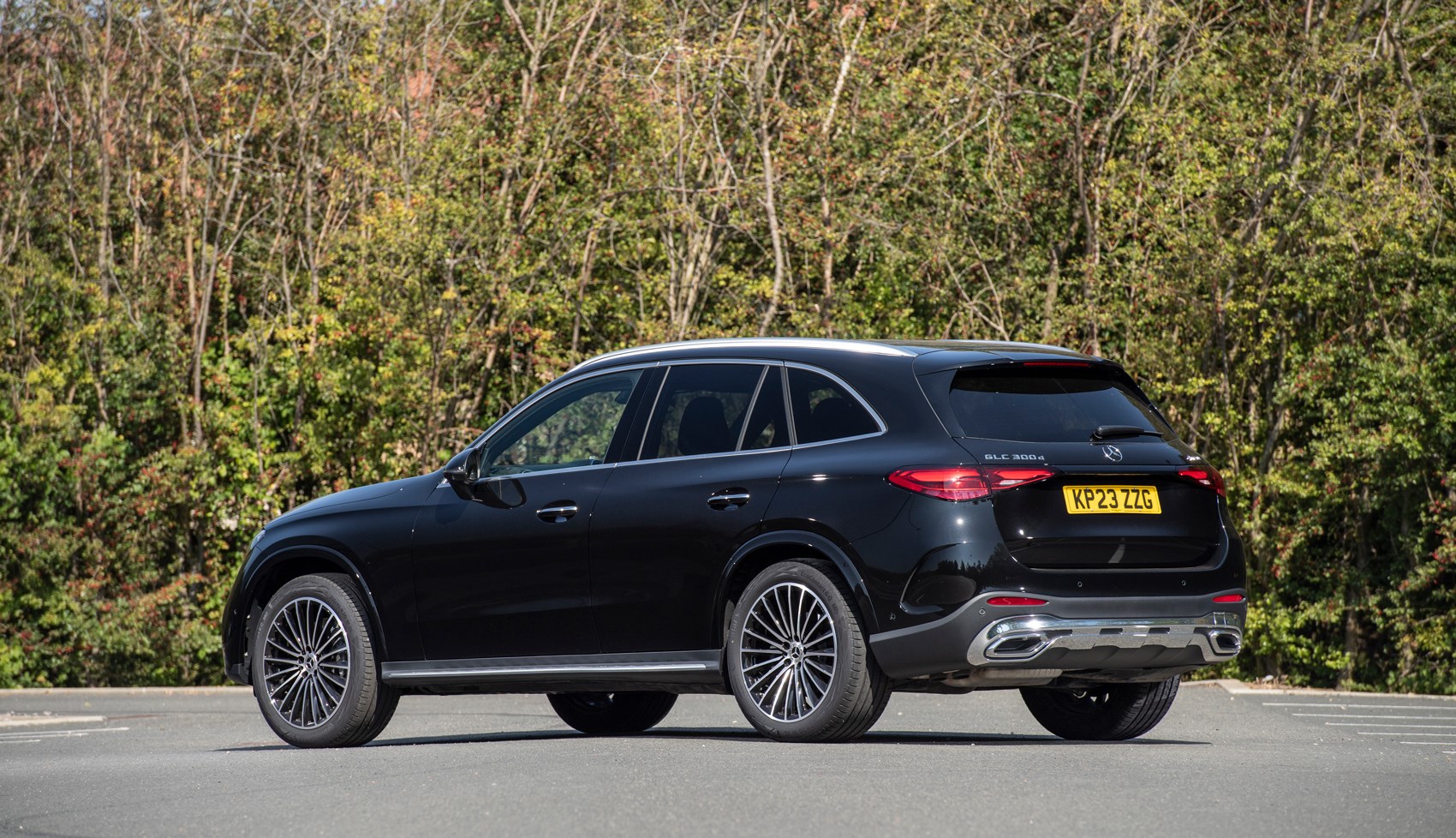
The bigger change is within, with an interior that almost exactly apes that of the current-gen C-Class. That means the GLC features a thickly-rimmed steering wheel with touch sensitive buttons on it and a large portrait-oriented infotainment screen that looks almost as if it rises up from the centre console.
What are the specs?
There are two mild hybrid diesels and one petrol engine in the UK range (all get a 21bhp e-boost from the MHEV system), as well as two plug-in hybrids. One of the PHEVs is petrol powered, the other is diesel-powered. Here’s a brief run-down of the performance data for the UK market:
- GLC 220d – Diesel, 194bhp, 8.0sec, 51.4-52.3mpg
- GLC 300d – Diesel, 265bhp, 6.3sec, 47.9-49.6mpg
- GLC 300 – Petrol, 254bhp, 6.2sec, 36.7-37.7mpg
- GLC 300e – Petrol plus electric, 335bhp, 6.7sec, 470.8-565mpg, 77-mile e-range
- GLC 300de – Diesel plus electric, 328bhp, 6.4sec, 706.3mpg, 73-mile e-range
A pretty mixed range, then, which includes some seriously big claimed electric-only ranges from the plug-in hybrids. There are also AMG four-cylinder hybrid models that we’ll test separately soon.
Then there’s the trim range, which hilariously is just spin-offs of the AMG Line formula (because we all love that spec so much here in the UK): AMG Line, AMG Line Premium, AMG Line Premium Plus. So, on top of a sportier bodykit, AMG sports suspension and larger wheels as standard over other markets, those additional specifications should be treated like option packs that just add more luxuries and tech on board.
What about the interior?
The new GLC is slightly less ergonomically complex than S-Class and EQS. Thanks to the ‘Zero Layer’ approach on the central touchscreen, the favourite icons are always within a one-touch reach on the main touchscreen, which either shows a full-size navigation map or a momentarily relevant detail. It’s one of the better infotainment layouts we’ve used, despite being almost completely lacking in any physical buttons.
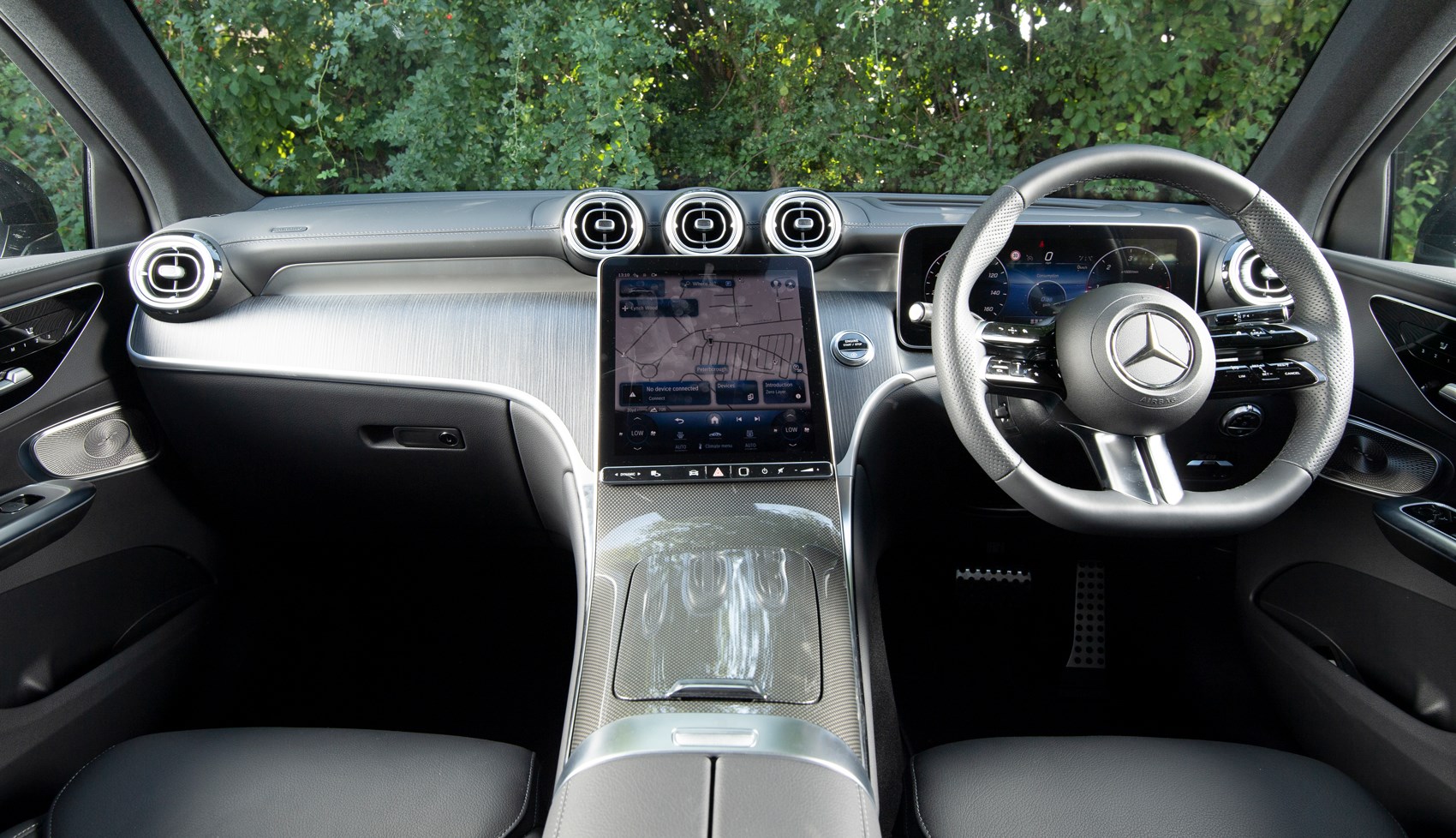
The touch-sensitive steering wheel instruments are more fiddly, though, requiring concentration when you’re trying to switch certain features on or off and the likelihood you might accidentally change the look of the instrument panel if you graze a thumb over the directional pad. The seats in our UK test cars felt unforgivingly firm, too, despite a lot of available adjustment.
Material quality is mixed, as Mercedes models that aren’t high-end EQs, the latest E-Class or the S-Class always manage to feel a little cheap. Granted, the GLC is a lot less creaky than the previous generation’s interior used to be, but some of the dashboard panels still feel tinny or overly plasticky. That said, all of the more important touch points like the doorhandles, window switches and steering column stalks feel good.
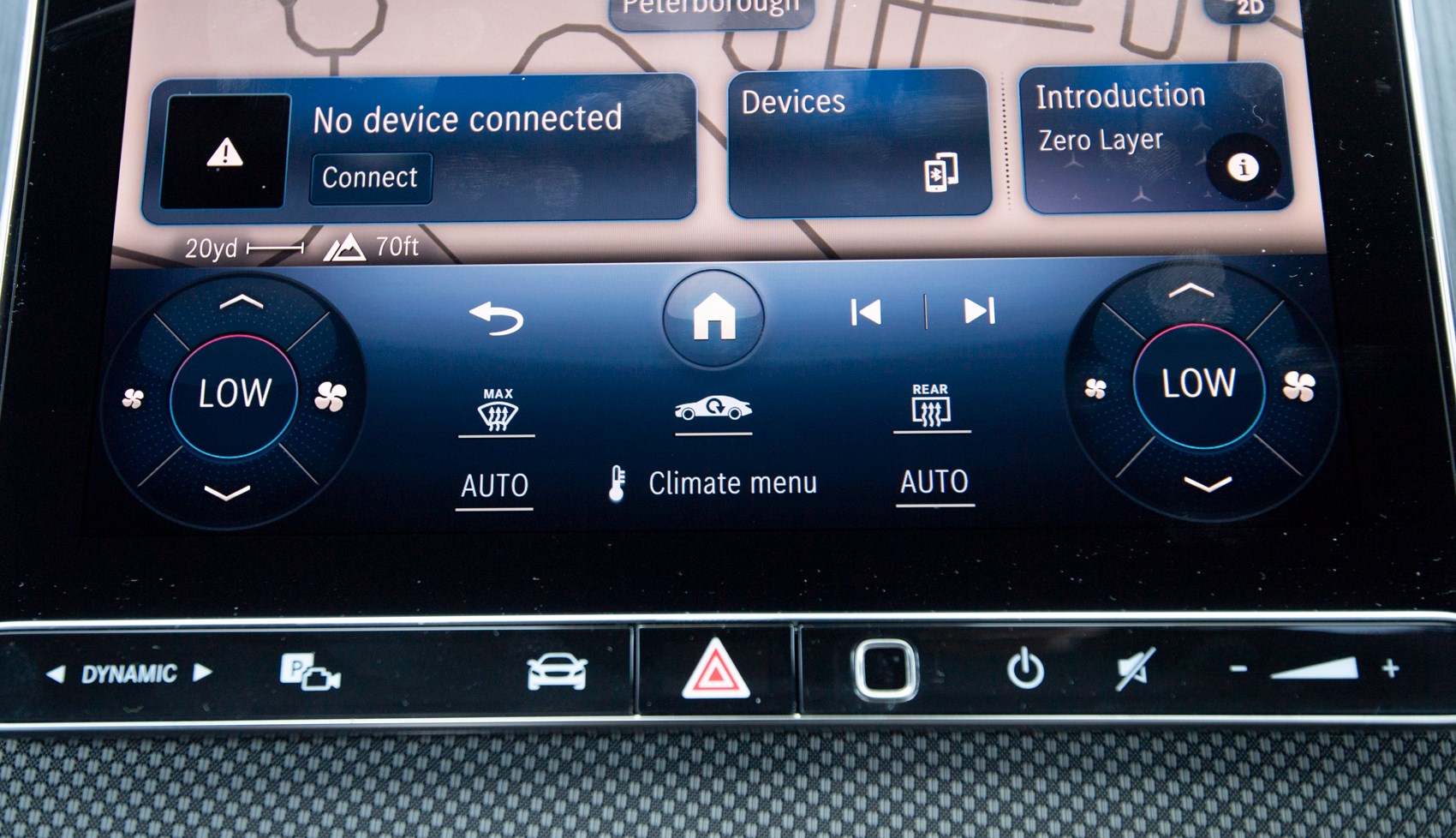
Elsewhere, space is decent in the second row and boot space (in the non-hybrid models) clocks in at 620 litres – bigger than an X3 or Q5 can offer.
How does the Mercedes GLC drive?
Overall, the GLC is not a car for the enthusiast – even if precious little in this class really is. There’s some sweet weighting to the steering, though, which makes the GLC quite satisfying to chuck into a bend. It’s welcomely backed up with fluid accuracy – particularly as you wind back off the lock.
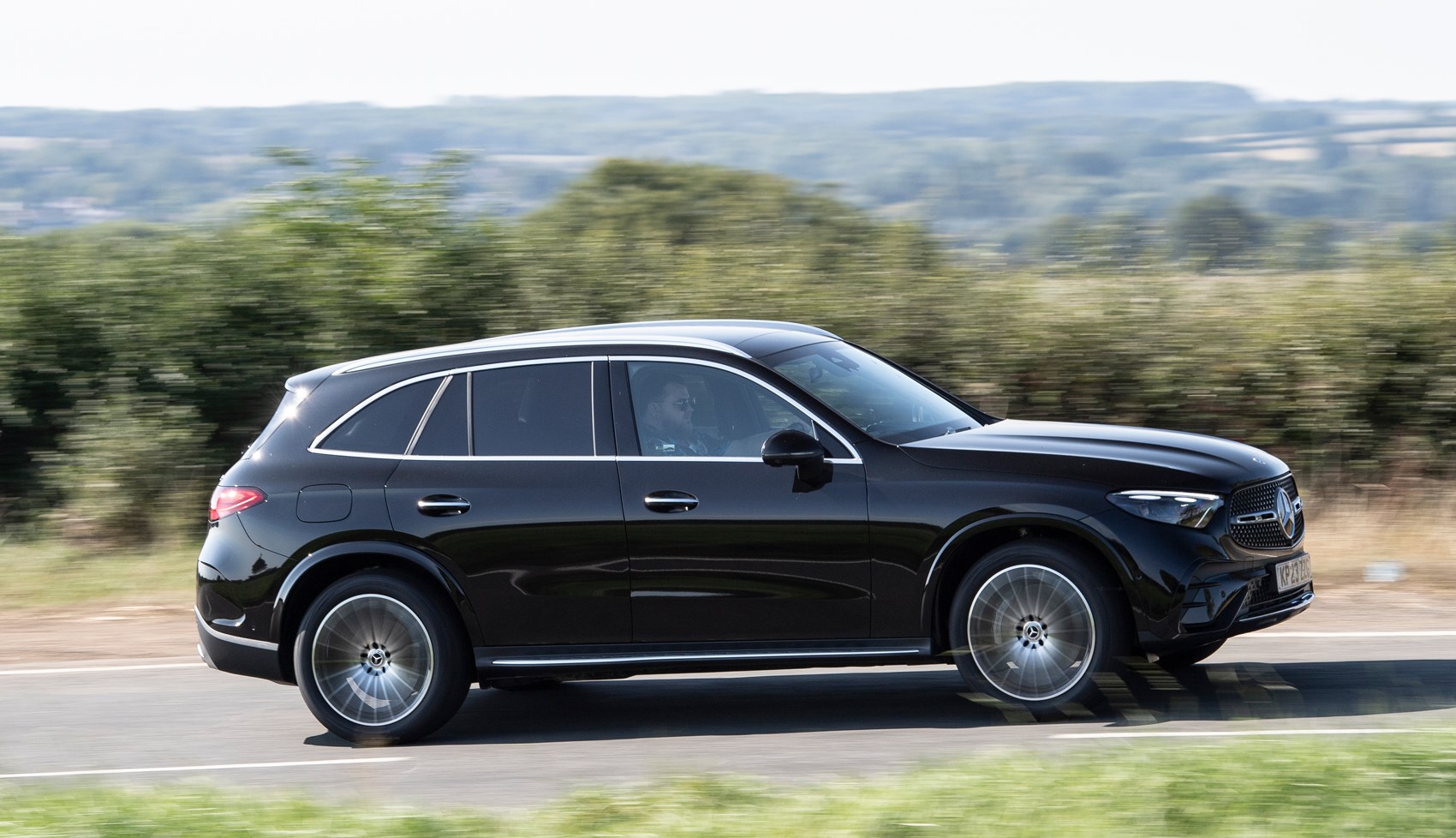
But the rest of the equation is all a bit bland and rough. The ride on the GLC 300 and 300d we’ve tested in the UK are a little all over the place, as it doesn’t really settle down; we’ve experienced jitters and jolts at low speeds and a nervousness at high speeds. Couple that with what felt like above average tyre noise on the Continental tyres on our test cars and the GLC doesn’t really make for that sweet of a car for long-distance drives.
And then we come to the engine range. As mentioned, we’ve tested 300 and 300d models on UK roads, and both deliver their punchy power outputs smoothly. Add to the fact that, from our experience, we’re pretty confident the 300d diesel can deliver its claimed fuel economy and the efficiency of the plug-in hybrids cannot be sniffed at – Mercedes has really delivered here.
But, and this is on a personal level as a road tester of several years, I remain unconvinced that Mercedes-Benz can make a four-cylinder engine that’s refined and quiet. Regardless of whether you go for the petrol or diesel, both sound like active cement mixers falling down a long flight of stairs – which is rather unbecoming of a premium SUV designed to waft and glide. BMW’s X3 and Audi’s Q5 – even with four-cylinder engines – just sound so much sweeter.
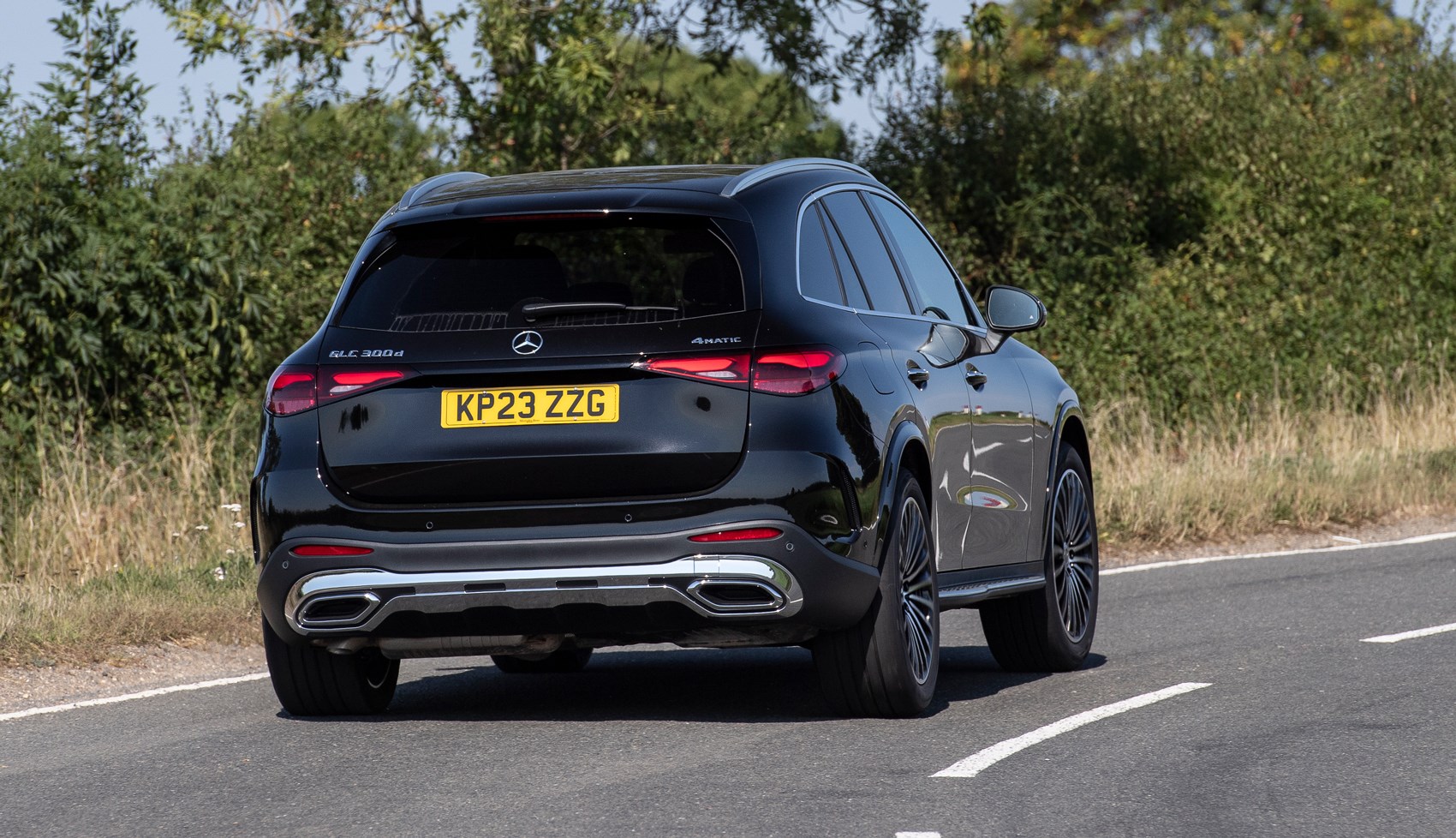
The powertrain mix isn’t helped by the nine-speed automatic. In short, it’s frustratingly indecisive at times – particularly from a standstill – with a serious amount of lag, which makes exploiting gaps at roundabouts almost a dream scenario. Requesting a little more acceleration from the throttle ad-hoc also means you have to wait for the ‘box to choose which of its nine ratios is best.
Mercedes GLC: verdict
We can see the reason why Mercedes’ GLC is one of its best-sellers in the UK and Europe. It’s got that three-pointed star on the front, it’s capable of competitive efficiency and features plenty of technology inside (provided you have the cash to raid the options list). This generation even has a seriously competitive luggage area.
But if these criteria aren’t high priorities, the GLC shouldn’t be on your shortlist. It’s not a remotely satisfying car to drive, with unrefined engines, a busier ride than we’ve experienced on some hardcore hot hatchbacks and a middling interior when it comes to quality and user-friendliness. A BMW X3 or even the utterly ancient Audi Q5 are much better in these areas.
Specs are for a Mercedes GLC 300d 4Matic AMG Line Premium